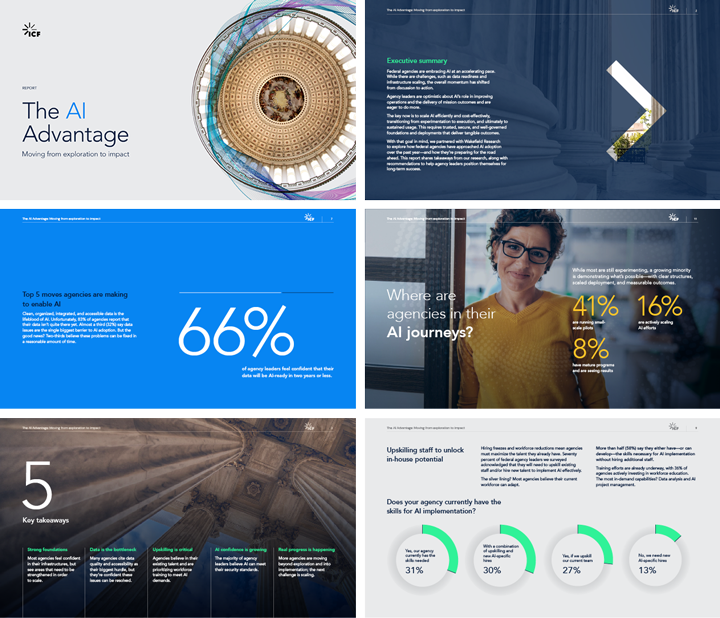
Unlocking the full potential of Learning Management Systems
Many employees have interacted with learning management systems (LMS). These web-based platforms house training courses and assessments and track performance, among many other capabilities.
LMSs are valuable tools for organizations because they democratize learning across large groups. These solutions also allow organizational leaders to track employee progress and competency against goals or compliance metrics. Advancements in technology (e.g., AI, virtual reality) are transforming the ways LMSs can teach and train employees, and new delivery models (e.g., microcredentials) are making learning more accessible than ever before.
Most federal agencies use LMS, but many aren’t getting the return on investment they need. To address this problem, agencies generally have three options:
- Stay with their current platform and enhance it.
- Ditch what they already have and purchase an off-the-shelf solution that better fits their organization’s needs.
- Build a customized system that better fits their needs from the ground up.
Choosing among these options requires a structured approach.
Analyze your current LMS state
How is your LMS being used—or not—right now? To gauge adoption and use, you can conduct surveys of employees or pull utilization data from the LMS itself. This information can help identify how and where your employees are encountering roadblocks. Common sticking points include:
- Implementation – If an LMS is not set up properly at the start, it has no chance to help an organization meet its goals down the road.
- Integration – If an LMS does not work with other technology products an organization is using, it reduces the likelihood that employees—and the organization at large—will use it.
- Data security – If an LMS does not have measures in place to protect any sensitive information (e.g., health data) it ingests, the system may be susceptible to a breach.
- Resistance to change – If employees aren’t comfortable using the LMS, they won’t, and the investment the organization makes in the technology will be for naught.
Consider new possibilities
Organizations should also think about the opportunities a new or improved LMS can present. For example:
- Are individual departments within the agency each using their own LMS? Choosing one platform that meets all of an agency’s learning and credentialing needs could save the agency money while introducing efficiencies in its training programs.
- Does your LMS have capabilities your agency isn’t using yet? For example, many LMS platforms can help an agency’s HR team track employee improvement plans and identify those whose increasing skill levels qualify them for promotion.
- What LMS “bells and whistles” might enhance your agency’s goals? This is where you can imagine and explore the benefits that tools like AI, virtual reality, and microlearning can bring to your organization.
Develop your LMS strategy
At this point, you know whether your current LMS is meeting your agency’s needs. You should also understand your budget and timeline constraints. With this information in hand, you can make your decision from those three options mentioned earlier.
- If you choose to keep your current platform, you can work with your technology partners to determine how it must change to meet your needs.
- If you want to buy an off-the-shelf option, you can research and demo products that appear to meet your needs, budget, and timeline.
- If you opt to build a customized system from the ground up, you can produce an RFP based on the information gathered in your analysis to identify potential partners for your LMS project.
Implement and monitor your strategy
How will your agency measure your LMS strategy’s success? As you’re implementing your new or improved platform, consider the key performance indicators you’ll use to track progress. You can monitor those KPIs at regular intervals to determine whether the LMS is meeting your needs, or your strategy needs an adjustment.
Choosing a partner for LMS modernization
This kind of structured approach to improving or implementing an LMS can help prevent your platform from becoming an underutilized—and expensive—repository of training documents and videos. A thoughtful LMS strategy can increase user engagement and compliance, improve integration with other organizational technology, and adapt as agency needs dictate.
The catch? This approach can be resource- and time-consuming. Many agencies may not be able to undertake this kind of effort on their own while completing their mission-critical work. Choosing a trusted partner to guide your agency through this process can help.
ICF experts have deep experience in LMS and training programs, as part of our broader suite of digital modernization work for federal agencies. Our teams can share strategies to address your pain points and insights on the strengths and weaknesses of different LMS solutions on the market. If your strategy calls for a custom-built LMS, ICF offers comprehensive support, from research to development to change management.
To learn more about how ICF’s expertise can help modernize your LMS strategy, please contact us today.
